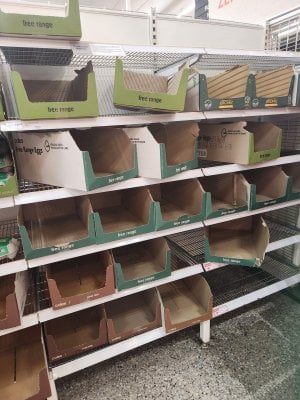Scrambling for Breakfast? Find Out Why Eggs Are Disappearing from Store Shelves!
- Replies 6
The humble egg, a staple in Australian breakfasts, has become an elusive commodity in supermarkets across the nation. Shoppers are facing the reality of empty shelves where eggs once sat in abundance, and the question on everyone's lips is: why has this happened, and when will the egg supply bounce back?
The current egg shortage is the result of a perfect storm of avian influenza outbreaks and challenging seasonal conditions, which have significantly disrupted the supply chain. The impact of these factors is being felt across major supermarket chains such as Coles and Woolworths, as well as independent stores, leaving consumers scrambling to find alternatives for their morning meals.
The avian influenza, commonly known as bird flu, has hit poultry farms hard, leading to the culling of approximately 1.8 million birds earlier this year. This loss has had a profound effect on egg production, with Egg Farmers of Australia indicating that recovery and an increase in supply will be a slow process.

Joshua Murray, the founder of Josh's Rainbow Eggs, which supplies eggs to various retailers in Victoria and parts of New South Wales, describes the situation as the 'aftershock' of the devastating wave of avian influenza. With nearly two million birds out of the supply chain and no possibility of importing eggs to fill the gap, the industry is unable to meet the usual demand.
The challenge of ramping up egg production is not one that can be solved overnight. As Mr. Murray points out, it requires significant foresight and investment. Hens do not begin laying eggs until they are around 16 weeks old, which means there is a considerable waiting period before newly reared flocks can contribute to the market.
Melinda Hashimoto, chief executive of Egg Farmers of Australia, echoes this sentiment, explaining that the lifecycle of hens and their laying patterns are not instantaneous. The colder weather and shorter daylight hours of winter naturally decrease hens' egg production, which only compounds the current shortage.
While some regions may be experiencing more acute shortages, it's not a nationwide issue. Many Australians are turning to local egg farmer shops, fruit markets, and butchers that stock eggs, supporting smaller businesses and finding their egg fix away from the larger supermarkets.
Fred Harrison, chief executive of Ritchies IGA, which operates over 140 independent stores across the east coast, describes the supply as coming in 'dribs and drabs.' This sporadic availability adds to the uncertainty for both retailers and consumers, making it difficult to predict when the situation will stabilize.
As we navigate this shortage, it's important for consumers to understand the complexities of egg production and the factors that can disrupt it. In the meantime, Australians might need to get creative with their breakfast choices or seek out local suppliers who may have better luck keeping eggs in stock.
For those loyal to their morning eggs, patience and support for local producers will be key until the industry can recover from this unprecedented setback. And for the egg industry, the current crisis underscores the importance of biosecurity measures and the need for robust contingency plans to deal with such disruptions in the future.

Members, have you noticed the egg shortage in your local supermarkets? How has it affected your shopping habits or breakfast routines? Share your experiences and any tips you might have for finding eggs during this shortage in the comments below. Let's crack this issue together and keep our breakfast plates full!
The current egg shortage is the result of a perfect storm of avian influenza outbreaks and challenging seasonal conditions, which have significantly disrupted the supply chain. The impact of these factors is being felt across major supermarket chains such as Coles and Woolworths, as well as independent stores, leaving consumers scrambling to find alternatives for their morning meals.
The avian influenza, commonly known as bird flu, has hit poultry farms hard, leading to the culling of approximately 1.8 million birds earlier this year. This loss has had a profound effect on egg production, with Egg Farmers of Australia indicating that recovery and an increase in supply will be a slow process.

Supermarkets across Australia, including Coles and Woolworths, face empty egg shelves due to supply chain disruptions. Credit: Facebook / Kathryn Jackson
Joshua Murray, the founder of Josh's Rainbow Eggs, which supplies eggs to various retailers in Victoria and parts of New South Wales, describes the situation as the 'aftershock' of the devastating wave of avian influenza. With nearly two million birds out of the supply chain and no possibility of importing eggs to fill the gap, the industry is unable to meet the usual demand.
The challenge of ramping up egg production is not one that can be solved overnight. As Mr. Murray points out, it requires significant foresight and investment. Hens do not begin laying eggs until they are around 16 weeks old, which means there is a considerable waiting period before newly reared flocks can contribute to the market.
Melinda Hashimoto, chief executive of Egg Farmers of Australia, echoes this sentiment, explaining that the lifecycle of hens and their laying patterns are not instantaneous. The colder weather and shorter daylight hours of winter naturally decrease hens' egg production, which only compounds the current shortage.
While some regions may be experiencing more acute shortages, it's not a nationwide issue. Many Australians are turning to local egg farmer shops, fruit markets, and butchers that stock eggs, supporting smaller businesses and finding their egg fix away from the larger supermarkets.
Fred Harrison, chief executive of Ritchies IGA, which operates over 140 independent stores across the east coast, describes the supply as coming in 'dribs and drabs.' This sporadic availability adds to the uncertainty for both retailers and consumers, making it difficult to predict when the situation will stabilize.
As we navigate this shortage, it's important for consumers to understand the complexities of egg production and the factors that can disrupt it. In the meantime, Australians might need to get creative with their breakfast choices or seek out local suppliers who may have better luck keeping eggs in stock.
For those loyal to their morning eggs, patience and support for local producers will be key until the industry can recover from this unprecedented setback. And for the egg industry, the current crisis underscores the importance of biosecurity measures and the need for robust contingency plans to deal with such disruptions in the future.
Key Takeaways
- Supermarkets across Australia, including Coles and Woolworths, are encountering empty egg shelves due to disruptions in the supply chain.
- The supply issues are a result of a significant avian influenza outbreak and adverse seasonal conditions, leading to the culling of about 1.8 million birds.
- Egg Farmers of Australia indicated that increasing egg production would take time because of the life cycle of hens and the incapacity to quickly scale up production.
- While some regions may see fewer eggs on shelves, consumers are turning to local farms and markets for their egg supplies.







